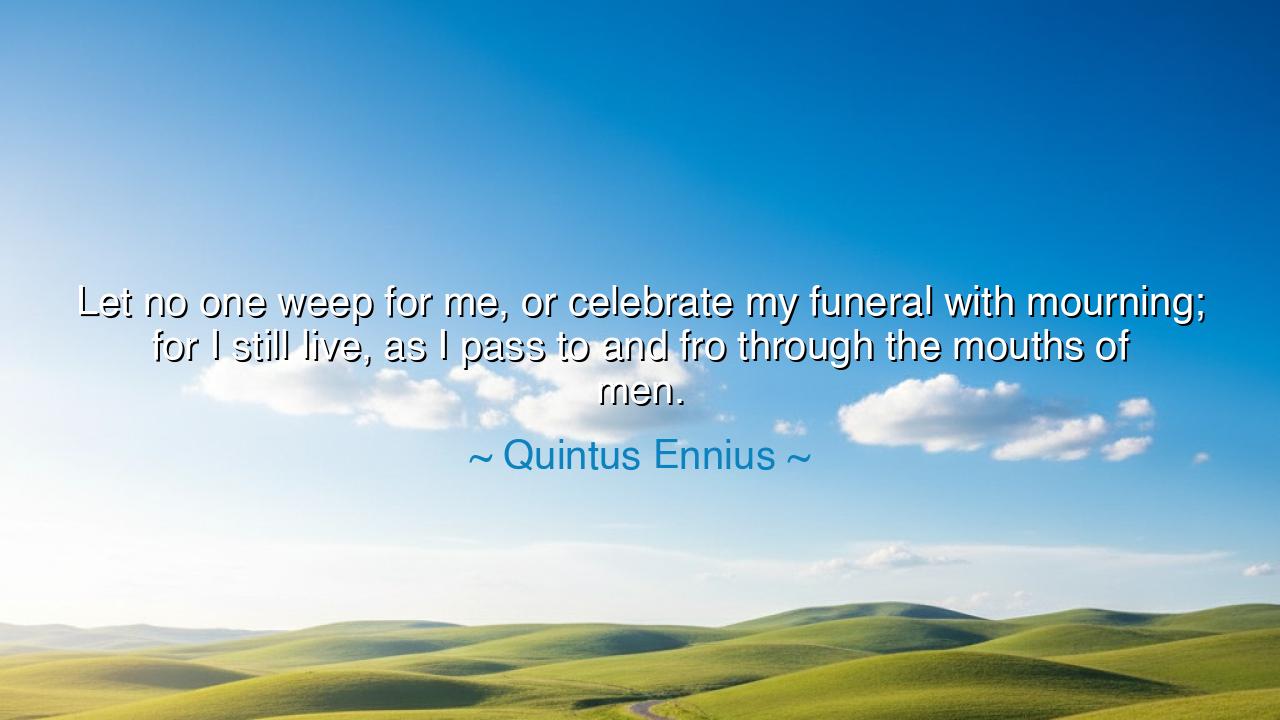
Let no one weep for me, or celebrate my funeral with mourning;
Let no one weep for me, or celebrate my funeral with mourning; for I still live, as I pass to and fro through the mouths of men.






Hear the immortal words of Quintus Ennius, father of Roman poetry, who declared: “Let no one weep for me, or celebrate my funeral with mourning; for I still live, as I pass to and fro through the mouths of men.” In this utterance, Ennius proclaims a truth older than empires and fresher than the morning: that while the body perishes, the word endures; while flesh falls to dust, memory and speech carry the essence of a man beyond the grave. It is not in tombs that the great live on, but in the lips and hearts of those who remember.
The meaning of this saying lies in the power of legacy. For mourning is natural, yet Ennius bids his people not to dwell in grief, but to rejoice in the endurance of his spirit. He understood that the poet’s task is to weave words so strong that they outlast stone. Each time a verse is spoken, each time a story is told, the dead return, walking among the living, alive in memory. Thus, Ennius sought not immortality of body, but immortality of voice—the kind that flows forever through generations.
Consider the story of Homer, whose very life is shrouded in mystery. We do not know the face of the man, nor the place of his birth, nor the hour of his death. Yet he walks still among us, for the Iliad and Odyssey remain sung in countless tongues. Warriors, lovers, wanderers, and kings—his creations echo endlessly, giving life to their maker. So too did Ennius know that he would live as long as his words were spoken, carried like a flame from mouth to mouth, across the ages.
History gives us another mirror in Socrates, who drank the hemlock yet refused to fear death. For he believed that his words, his teachings, his questions, would live on in the dialogues of his disciples. And indeed, long after the cup was drained, the voice of Socrates still speaks through Plato, echoing in academies and marketplaces of the mind. Here again we see the truth of Ennius’ vision: the dead who leave behind wisdom do not vanish—they walk through the speech of the living.
There is also a deeper heroism in these words. For Ennius does not deny death—he transforms it. To him, the funeral need not be a place of despair, for he has already planted himself in the souls of others. It is a call to the living: do not bury your grief in silence, but carry forward the stories, the songs, the deeds. Mourning fades, but memory spoken aloud is a kind of resurrection. He challenges us to understand that true immortality is not found in temples or statues, but in the tongues of men and women who keep alive the essence of a life.
The lesson here is clear: live in such a way that your presence cannot be extinguished by death. Speak words worth remembering, do deeds worth retelling, love in ways that others cannot help but share. Do not seek merely to be mourned—seek to be carried in memory. For when people speak your name with reverence, with laughter, with gratitude, you continue to live as surely as if you walked among them.
So, children of tomorrow, take these words as both comfort and command: do not fear the grave, for it is not the end. Live so that your voice endures, so that your story is told. Let your compassion, your courage, your wisdom pass into others, until you too move through the mouths of men long after your body has rested. For as Ennius proclaimed, “I still live,” and so may you, if you plant seeds in the memory of humankind that will bloom for generations.






AAdministratorAdministrator
Welcome, honored guests. Please leave a comment, we will respond soon